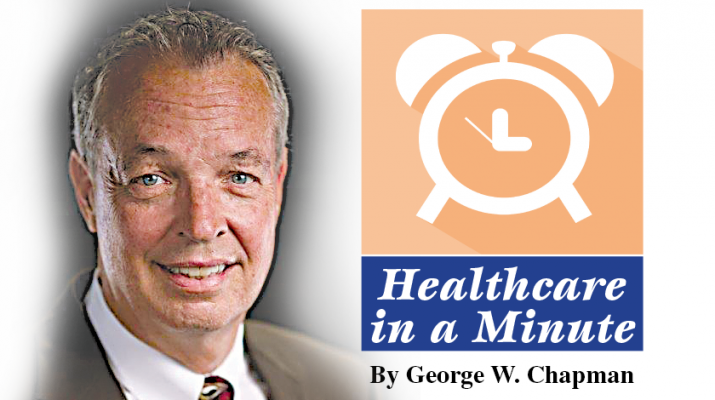By George W. Chapman
If you want to see the future of healthcare, (good or bad), in at least primary care, watch what the retail giant is doing. With more than 5,000 locations throughout the U.S., including rural areas where providers are in scarce supply, Walmart is uniquely positioned (and financed) to have huge impacts on the healthcare costs, delivery and outcomes. Plans include expanding in-store walk-in clinics, telemedicine, discounted drugs and supplies, a universal electronic medical record and a new venture with self-insured businesses. Walmart is leveraging its massive purchasing power to get discounts from both drug and supply manufacturers. (So, drug companies do negotiate discounts. But it literally takes an act of Congress to allow Medicare, with its huge purchasing power, to negotiate discounts. Maybe Medicare should buy its drugs through Walmart? Sorry.,I digress.) Walmart employs community healthcare workers like nurse practitioners, nurses, care coordinators, dietitians and medical assistants knowing that 70% of health outcomes depend on our personal habits and behaviors and social determinants like decent housing, access to care, transportation, income, ethnicity and diet.
Finally!?
We may be, finally, somewhat closer to relief on exorbitant drug prices, which are often the root cause of personal bankruptcy. For decades, the ubiquitous drug lobby has fought to prevent any price concessions. Medicare’s “permission” to deploy its massive 160 million people purchasing power, a la Walmart, to merely negotiate with drug manufacturers is included in the much ballyhooed human infrastructure bill that as of this writing is expected to be voted on by Congress. The bill gives Medicare permission to negotiate only a couple dozen drugs. Medicare will not attempt to throw its weight around on drugs that enjoy market exclusivity. Despite the recent flood of grossly misleading ads run by the drug manufacturers association intended to scare seniors, Medicare is not “setting” prices (like it unfairly does for hospitals and physicians). The price is “set” once it is mutually agreed upon by both parties in their negotiations.
Federal Vaccine Mandate
New York state has already mandated vaccines for healthcare workers. While it has resulted in some staff resignations, the overall impact has been negligible. Now the federal government has issued a vaccine mandate for all facilities, providers and healthcare support workers receiving Medicare or Medicaid funding. Virtually all healthcare facilities receive those funds. Facilities and workers have until Jan. 4 to comply. The federal mandate covers about 76,000 providers and 17 million support workers in more than 5,000 hospitals, 15,000+ nursing homes, clinics and private practices. Vaccines are critical to protecting those who are battling the virus for us on the front lines.
Virtual Visit First?
The pandemic has significantly increased the utilization of, acceptance of, and even the preference for, virtual visits or telemedicine. Banking on this trend, some insurers are offering new products that literally require your first visit (non-emergent) to be a virtual one. Most of these products also require you to select an “online provider” (in addition to your regular network physicians) who would then be authorized to “treat” and refer you to one of your regular providers for follow up if needed. These products are offered at lower premiums and there are no co-pays for the virtual visits. Skeptics are quick to point out the downsides. You have no idea who or where your “online provider” is. The provider could be in another state. Something may be missed on the virtual visit that could have been picked up during an in-person visit with your regular primary provider. Studies estimate about two-thirds of initial visits require in-person contact. While certainly not for everyone, this new product could be a viable option for relatively healthy consumers looking to reduce their medical expenses.
Hospitals Need to Change.
Hospital administrators and industry observers agree: the pandemic has forever altered hospitals’ operations and those slow to adapt will perish. A survey of 73 hospital executives was conducted by consulting firm Kaufman Hall. Hospitals must pay more attention to revenue cycle management, access to care, staff recruitment and retention, increasing supply costs, artificial intelligence and decreasing demand post pandemic. Ninety percent of respondents have already significantly raised staff compensation to attract and retain staff. An interesting caveat to decreasing demand is the surge in non-COVID related emergency room visits. The negative and consequential results of postponing or delaying care are now presenting in emergency rooms. Heart and respiratory problems, blood infections, organ failures and drug overdoses are once again filling ICUs as the pandemic weakens.
Lab professionals.
We need to take the following into consideration when impatient for COVID-19 test results. The healthcare industry was already facing staffing shortages prior to the pandemic. COVID-19 has exacerbated staff shortages leaving many positions unfilled. Behind the scene healthcare workers, like lab techs, are feeling the crunch just as is nursing. This impacts the immediacy of test results. Work in the clinical laboratory can be exciting, rewarding, and intellectually stimulating for those who enjoy science and its application toward patient care. However, the shortage of staff resources combined with increased pressure to provide COVID-19 test results quickly, all while trying to meet the day to day expectations for critical laboratory results, has created the perfect storm for clinical laboratory staff burn out. Burn out has increased retirements and resignations. Let’s appreciate the behind the scene healthcare workers who help providers diagnose the infected and inform the uninfected. We need to continue promoting these laboratory professions which is such a vital part of our healthcare along with the resources need to return to proper staffing levels.
George W. Chapman is a healthcare business consultant who works exclusively with physicians, hospitals and healthcare organizations. He operates GW Chapman Consulting based in Syracuse. Email him at gwc@gwchapmanconsulting.com.

